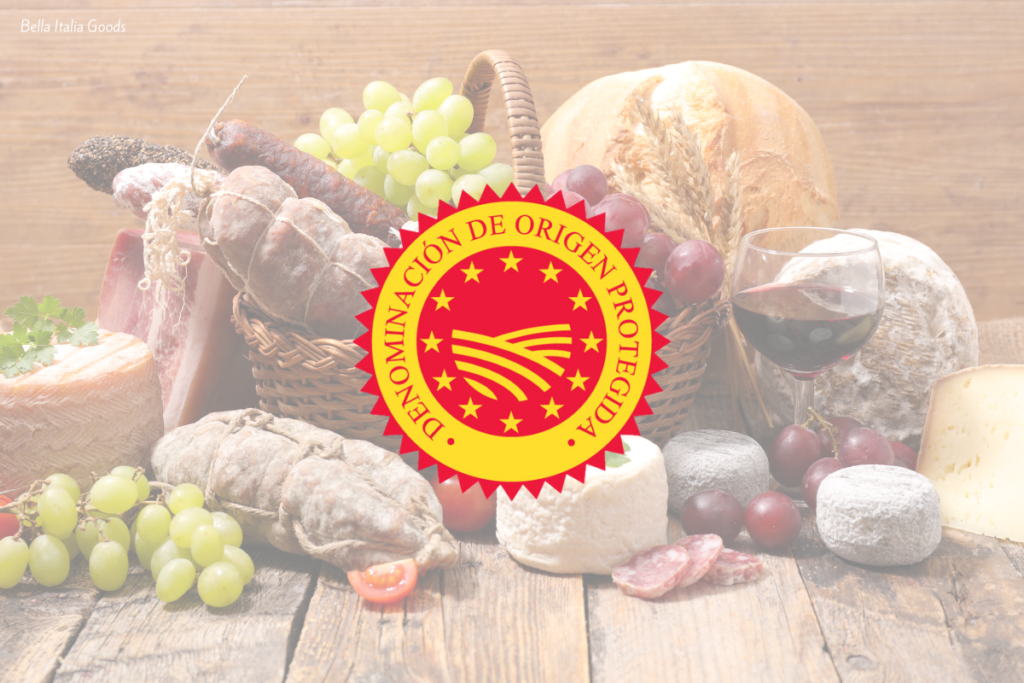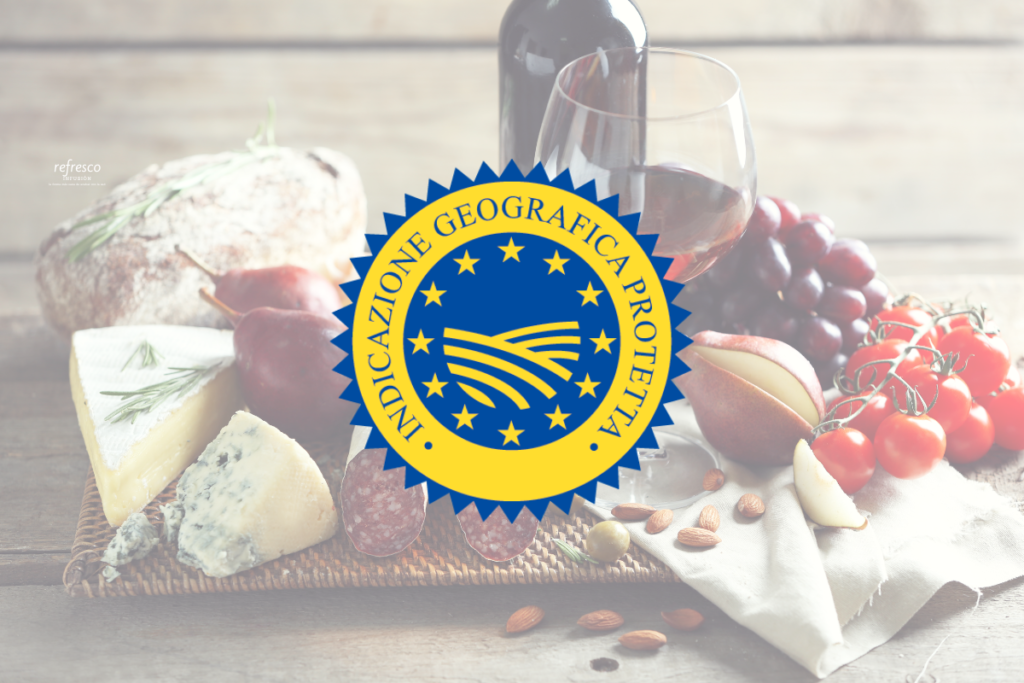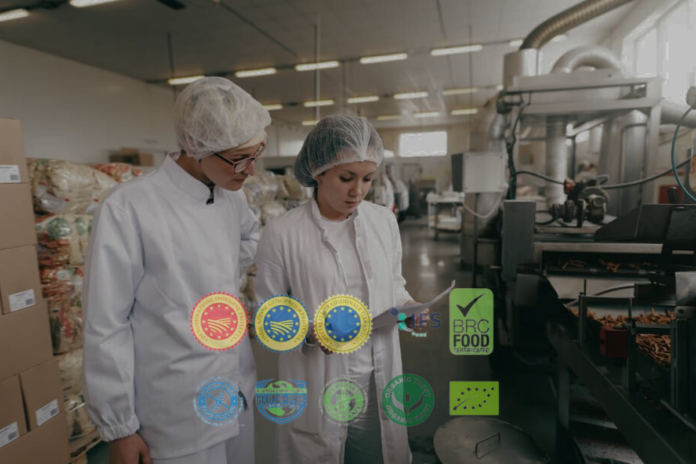Ah, Italy! A land where food is not just nourishment but an art form, a tradition, and a way of life. As passionate food lovers, we’ve embarked on a delightful journey to unravel the mysteries of Italian food certifications. Join us as we explore the labyrinth of labels, discover the top categories, and unveil the aspects and typical products for each designation.
Denominazione di Origine Protetta (DOP)

The “Protected Designation of Origin” is like the VIP lounge of Italian food certifications. Products with the DOP label are the crème de la crème, boasting unique characteristics tied to their geographical area.
This certification ensures that products are locally grown and processed within specific areas, adhering to traditional methods. DOP-certified products must follow strict production regulations and are subject to rigorous checks, which guarantee their quality and authenticity. This label is your assurance that you’re experiencing a product deeply rooted in local tradition and environment.
Top Categories and Products:
- Cheese: Parmigiano Reggiano, Gorgonzola, Pecorino Romano – each cheese is a reflection of its native soil, climate, and age-old production techniques.
- Olive Oil: Toscano, Colline Salernitane, Terra di Bari – these oils are pressed from olives grown in illustrious groves, carrying the essence of their landscape.
- Meat: Prosciutto di Parma, Speck Alto Adige, Capocollo di Calabria – cured using time-honored recipes, these meats are a festival of flavors.
- Fruits and Vegetables: Pomodoro di Pachino, Carciofo Romanesco, Fagioli di Sarconi – embodying the freshness and diversity of Italian produce.
- Vinegar: Aceto Balsamico Tradizionale di Modena – aged in wooden barrels, it’s a symphony of sweet and acidic notes.
Indicazione Geografica Protetta (IGP)

The “Protected Geographical Indication” is the badge of honor for foods closely linked to their geographical origin, where at least one production or processing phase occurs.
While not as strict as DOP, IGP still ensures that at least one production phase occurs in the designated area. This designation helps to protect the reputation of the regional foods and promotes rural and agricultural development by providing a premium price to the producers. IGP is a testament to a product’s reputation, characteristics, and quality that can be traced back to its geographic origin.
Top Categories and Products:
- Meat Products: Mortadella Bologna, Bresaola della Valtellina – savory delights that echo the traditions of their regions.
- Cheese: Asiago, Taleggio – cheeses that carry the distinct flavors and textures of their native pastures.
- Fruits and Vegetables: Arancia Rossa di Sicilia, Limone di Sorrento – fruits bursting with the sun-kissed taste of Italy.
- Bakery and Sweets: Pane di Altamura, Amaretti di Saronno – each bite tells a story of ancient baking traditions.
- Olive Oil: Olio di Calabria, Veneto Valpolicella – liquid gold, embodying the essence of their terrains.
Denominazione di Origine Controllata e Garantita (DOCG)
The “Controlled and Guaranteed Designation of Origin” represents the pinnacle of quality for Italian wines, ensuring strict production methods and geographic authenticity.
This is the highest quality assurance label for Italian wines, indicating not only the area of production and the grapes used but also the strict adherence to specific winemaking procedures. DOCG wines are evaluated by a government-licensed committee before they can be bottled, ensuring that each bottle meets the highest standard of quality.
Top Categories and Products:
- Red Wines: Barolo, Brunello di Montalcino – wines with robust flavors, aged to perfection.
- White Wines: Vernaccia di San Gimignano, Franciacorta – offering a range of flavors from crisp to silky.
- Sparkling Wines: Asti, Conegliano Valdobbiadene Prosecco – effervescent and festive, perfect for celebrations.
- Dessert Wines: Vin Santo del Chianti, Moscato d’Asti – sweet and luscious, ideal for concluding a meal.
Denominazione di Origine Controllata (DOC)
The “Controlled Designation of Origin” ensures that each product comes from a specific, defined region, adhering to strict production standards to maintain quality and authenticity.
This label guarantees that a product has been produced, processed, and packaged in a specific geographical area and according to tradition. The DOC status is a notch below DOCG in terms of stringent quality controls but still signifies a high standard of quality and region-specific character.
Top Categories and Products:
- Red Wines: Valpolicella, Barbera d’Asti – capturing the heart and soul of their locales in every glass.
- White Wines: Soave, Verdicchio dei Castelli di Jesi – refreshing and diverse, reflecting the landscapes they come from.
- Cheese: Gorgonzola, Caciocavallo Silano – cheeses that are testaments to dairy artistry and tradition.
- Olive Oil: Riviera Ligure, Terra d’Otranto – these oils are a testament to the age-old olive cultivation and pressing traditions.
Traditional Speciality Guaranteed (TSG)
The TSG label, or “Specialità Tradizionale Garantita,” highlights traditional character, either in the composition or means of production.
This certification is about preserving recipes and methods of production. Foods bearing the TSG label are linked to a traditional composition or a traditional production method. The TSG certification aims to protect the name of a product, which is produced according to traditional methods or has traditional characteristics.
Top Categories and Products:
- Bakery: Pizza Napoletana, Pane di Genzano – iconic bread and pizza with unique textures and tastes.
- Dairy: Mozzarella, Burrata – creamy and dreamy, these dairy products are the epitome of Italian cheese-making.
- Pasta: Trofie, Orecchiette – each pasta shape carries with it a history and method of preparation that’s been passed down through generations.
Biologico (BIO) – The Emblem of Organic Integrity
The BIO certification in Italy is governed by European Union (EU) organic regulations, which are among the most stringent in the world. Products carrying the “Biologico” label must be produced in accordance with these standards, which include the prohibition of synthetic chemicals, artificial fertilizers, genetically modified organisms (GMOs), and the implementation of environmentally sustainable practices.
Key aspects of the BIO certification include:
- Sustainable Practices: Organic farming methods are employed, which promote ecological balance, conserve biodiversity, and enhance soil fertility.
- No GMOs: Genetically modified organisms are strictly prohibited in organic production.
- Chemical Restrictions: The use of synthetic pesticides, herbicides, and fertilizers is banned. Only natural substances and biological control methods are permitted to manage pests and diseases.
- Animal Welfare: In the case of organic livestock, animals must be raised in conditions that allow for natural behaviors, with access to the outdoors and organic feed.
- Verification and Control: Farms and facilities must undergo regular inspections by certified organic control bodies to ensure compliance with organic standards.
Add some of these products to your next Italian Culinary Adventure
By understanding these certifications, we can appreciate the cultural heritage and meticulous craft that define Italian cuisine. Each label tells a story of tradition, provenance, and quality, guiding us to authentic and extraordinary culinary experiences. Buon appetito!


